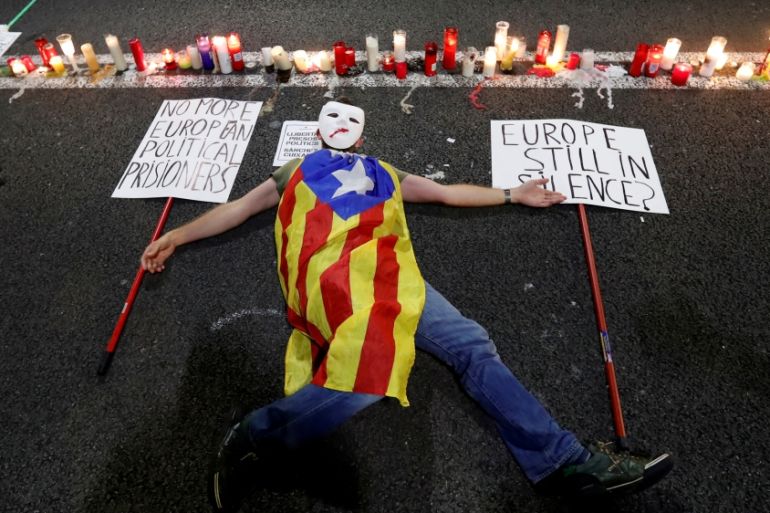Thousands demand release of jailed Catalan separatists
More than 200,000 march in Barcelona, calling for release two separatists leaders detained on sedition charges.

More than 200,000 people took to the streets in Barcelona, demanding the release of two men they consider political prisoners after they were arrested earlier this week on charges of sedition.
Chanting “Freedom for Sanchez and Cuixart!” protesters called for the release of Jordi Cuixart of Omnium Cultural and Jordi Sanchez of the National Catalan Assembly (ANC) who were imprisoned without bail in Madrid on Monday, pending a trial on charges of sedition in relation to their separatist organising efforts.
Keep reading
list of 4 itemsLarge protests against Catalan amnesty deal in Madrid after PM sworn in
Thousands protest against Catalan amnesty in Spain
Spain’s Sanchez set to stay PM after amnesty deal with Catalan separatists
The 200,000-strong march took place late on Tuesday with the help of Committees for the Defense of the Referendum (CDR), neighbourhood groups created at the beginning of October to “defend the Catalan right to vote,” Anna Martinez, one of the CDR organisers, told Al Jazeera.
Martinez is affiliated with a CDR in La Verneda – La Pau, a working-class area in the northwest of Barcelona.
She said she never thought the Spanish government would take political prisoners.
“It’s shocking. The situation has become very serious,” she said.
‘Freedom!’
The rally started earlier on Tuesday as CDRs and other groups marched towards the Spanish delegation in Barcelona, meeting along the way.
Their number seemed to grow with each block.
Joan Folch lived in France for 24 years and moved back in September because of the political situation. He said he was outraged by the imprisonment of the pro-independence leaders.
The Catalan national movement is unique in that it has support from the political left to right, Folch explained, adding that he believes the movement is growing.
“Every day, the Spanish government gives us more reasons to continue the struggle,” he concluded.
The group of 50 met a larger block of protesters at the beginning of Diagonal, one of Barcelona’s main thoroughfares.
Though the demonstration blocked traffic, drivers honked in support.
By the time the CDRs and other groups reached the Spanish delegation, their numbers reached at least 200,000.
![Protesters raise their candles in the air as a police helicopter passes [Creede Newton/Al Jazeera]](/wp-content/uploads/2017/10/b71fdd68e5ed4cffb319f2dc869b7ab8_18.jpeg)
Demonstrators lit candles and held a five-minute moment of silence for Cuixart and Sanchez before a protester screamed “Freedom!” to which the 200,000-strong crowd responded in kind.
The crowd was diverse. Some wore suits, while others were in torn jeans. The young helped the elderly light candles in the dark.
Octavi Martin, 39, told Al Jazeera that Madrid taking political prisoners signifies a turning point. “We’re tired of negotiating with Spain. Independence is irreversible.
We’re prepared to resist Madrid – non-violently – longer than Madrid can repress us.”
Shortly after the procession arrived, a police helicopter began flying overhead. With each pass, protesters held up their candles and screamed.
“There have been helicopters constantly since the referendum. It’s a bother. Now, we can bother them,” Eva Torrents, 21, told Al Jazeera.
‘Putting everyone in their place’
The imprisonment of the two separatist leaders was warmly received by figures in the ruling right-wing Popular Party (PP).
Spanish Justice Minister Rafael Catala said the Catalan leaders’ imprisonment represented the “normal functioning of Spanish justice”, adding, “we can talk about prison policy, but not political prisoners.”
Xavier Garcia Albiol, leader of Catalonia’s PP, applauded the decision to imprison Cuixart and Sanchez.
“Rule of law ends up putting everyone in their place,” he tweeted.
But Josep Costa, a professor of political science at Barcelona’s Universitat Pompeu Fabra, said the imprisonment marked “another episode showing the complete breakdown of rule of law in Spain.”
“It’s the government filing the charges and seeking the imprisonment of political opponents,” Costa said.
Jordi Graupera, a Catalan author and postdoctoral researcher at Princeton, agreed: “They are political prisoners. They are being punished for being successful in their peaceful resistance strategy,” he told Al Jazeera.
Standoff
Omnium and the ANC are grassroots organisations that have long assisted in pro-independence campaigns, including the disputed October 1 referendum on Catalan independence.
The imprisonment of Cuixart and Sanchez, the leaders of both groups, is the latest development in a heightening political crisis in Spain.
The Spanish constitutional court ruled the October 1 Catalan referendum unlawful, with Madrid ordering police to stop the poll while respecting voters.
But Spanish National Police and the Civil Guard, a military body tasked with law enforcement, used “excessive force” to stop the vote, according to rights groups.
Catalans voted to secede from Spain, but turnout was reportedly lower than 50 percent.
On October 10, Catalan President Carles Puigdemont declared an independent Catalan state and then suspended the effects of the declaration. He says his intent was to foster dialogue with Madrid.
Spanish Prime Minister Mariano Rajoy then gave him until Monday morning to clarify whether or not independence was declared, warning that he would enact Article 155.
Referred to as the “nuclear option”, Article 155 of the Spanish constitution has never been used before and allows the central government to take control of Catalonia‘s regional government.
Puigdemont responded Monday with an offer of two months of dialogue, but failed to clarify the stance on independence.
Madrid has extended the ultimatum until Thursday morning. The central government has reiterated its warning that if Puigdemont does not clarify his stance by this deadline, Article 155 will be enacted.